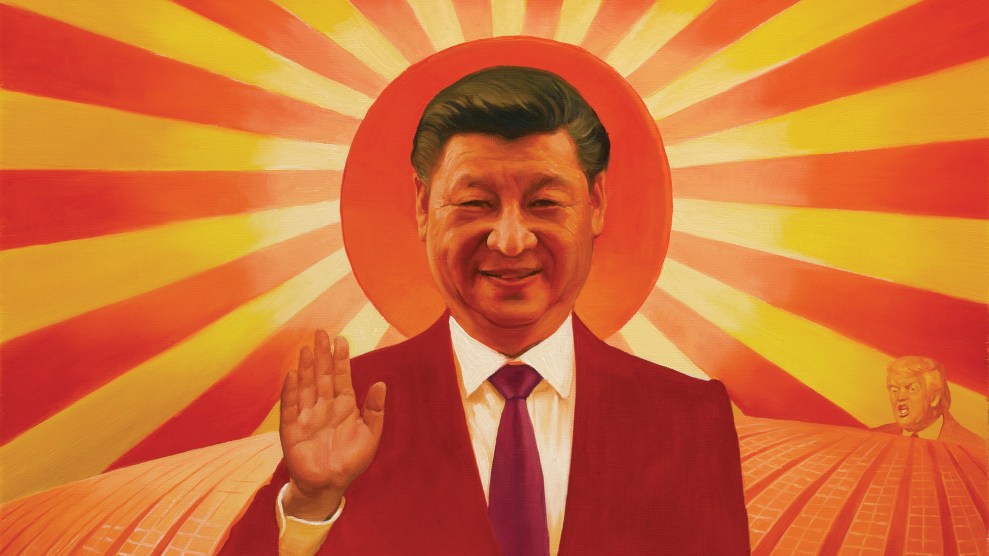
K. Stange/DPA/ZUMA Wire
When the University of Minnesota established a Confucius Institute, or center for Chinese language learning, in September 2008, it quickly turned into one of China’s overseas success stories. With its efforts to promote the study of Chinese among students “from preschool to 12th grade,” the Minnesota center won plaudits from Hanban, a Chinese government organization that oversees the institutes and China’s other international language partnerships. Three years after its opening, the Minnesota outpost was named a Confucius Institute of the Year and between 2014 and 2018, China contributed more than $1.2 million toward the Minnesota center’s operation, according to a report in the Minnesota Daily student newspaper.
In June, the university will cut ties with Hanban, and Minnesota’s Confucius Institute will close. University officials cited a desire to refocus “our China-related activities through a strengthened and enhanced China Center,” spokesperson Katrinna Dodge said in an email to Mother Jones. In doing this, Minnesota joins the ranks of roughly a dozen other American colleges that have abandoned their partnerships with Hanban amid increasing criticism of Beijing’s growing authoritarianism and hostility to free speech. “Most agreements establishing Confucius Institutes feature nondisclosure clauses and unacceptable concessions to the political aims and practices of the government of China,” the American Association of University Professors concluded in a 2014 report, which said the centers “function as an arm of the Chinese state and are allowed to ignore academic freedom.”
Beijing first imported Confucius Institutes to American universities in 2004, offering generous subsidies and even staff, but the centers have attracted controversy from the start. As retired Communist Party bigwig Li Changchun once said, these institutes are “an important part of China’s overseas propaganda set-up.” Marshall Sahlins, a University of Chicago anthropologist, called them “academic malware” with propaganda objectives “as old as the imperial era.” Many scholars and lawmakers wanted nothing to do with the institutes, which use an authoritarian government’s money to bankroll hundreds of classes and programs at colleges, high schools, and elementary schools. Now, as tensions between the US and China have increased, the White House, lawmakers from both parties, and the intelligence community have singled out Confucius Institutes as a nefarious symbol of China’s creeping influence.
In a January Senate hearing, FBI Director Christopher Wray said China posed a threat “more deep, more diverse, more vexing, more challenging, more comprehensive, and more concerning than any counterintelligence threat I can think of.” He acknowledged last year that federal agents had targeted some Confucius Institutes with “appropriate investigative steps” over concerns of improper Chinese influence. Sen. Marco Rubio (R-Fla.) introduced a bill last month that would require Confucius Institutes to register with the Justice Department as foreign agents, which quickly gained bipartisan support, and the most recent defense appropriations bill restricts schools with Confucius Institutes from receiving Pentagon language grants.
“Foreign governments should not be funding student organizations on the campuses of democratic societies,” says Larry Diamond, a senior fellow at Stanford University’s Hoover Institution, who examined Chinese influence in American higher education for a November report. “And certainly not the foreign government of authoritarian countries.”
In addition to citing concerns about transparency and censorship, lawmakers have also identified a glaring discrepancy between the freedoms afforded to Confucius Institutes in the United States and China’s crackdown on a similar slate of American-run centers abroad. In February, a bipartisan report from the Senate Homeland Security subcommittee on investigations identified “over 80 instances in the past four years” in which China interfered with State Department efforts to set up and access “American Cultural Centers” at Chinese universities. The US chose to stop funding the program last year amid continuing obstacles put in place by China. The report also noted that “nearly 70 percent” of US schools neglected to report Hanban contributions to the Department of Education, despite a requirement that postsecondary institutions report foreign gifts above a certain threshold.
Sen. Tom Carper (D-Del.), the subcommittee’s top Democrat, released a statement with the report that compared China’s influence activities with Russia’s efforts to intervene in the 2016 presidential election. “Given what our country experienced during the 2016 election and what we’re preparing to grapple with in 2020,” he said, “it is critical that we be vigilant in combatting foreign efforts to influence American public opinion.”
Diamond does not consider Confucius Institutes a security issue on par with China’s increasing surveillance of its own citizens or its widespread theft of intellectual property, but he argues that unless contracts with Hanban are made public, and assurances put in place to ensure American law governs the centers, the agreements “should be terminated.” Gao Qing, who directed George Mason University’s Confucius Institute and now runs a nonprofit in Washington, DC, that advocates for these centers nationwide, wrote in an email to Mother Jones that Confucius Institutes are meant to offer “apolitical educational programs” and not “engage with any political activity and do not teach politics and policies.”
Confucius, the ancient philosopher whose teachings fell out of favor after the Communist Revolution, became the perfect symbol for China’s foreign renaissance when fifteen years ago, government officials formed a Chinese language-learning center in Seoul. More than a century after China ceded control of the Korean peninsula to Japan—and with it, wider influence over the Asia-Pacific region—Beijing was mounting a comeback in its own backyard. Who better to adorn the name of its signature foreign influence project than Confucius, a philosopher of seismic importance with a name much easier to market overseas than Marx or Mao.
In the United States, interest in learning Chinese had been rising, but a shortage of qualified instructors left school administrators searching for help. By 2008, only 3 percent of elementary schools with language programs taught Chinese. After planting roots in South Korea, in 2004, Chinese officials unveiled their first US outpost at the University of Maryland. Between 1991 and 1994, Annapolis had slashed funding for state universities by nearly 20 percent, resulting in dramatic cuts at College Park, the University of Maryland’s flagship site. Administrators eliminated eight departments and 23 degree programs, according to the Hechinger Report, a nonprofit education news site, so an infusion of Chinese funding looked even more appealing. But some faculty members became uncomfortable with the arrangement. David Prager Branner, then an associate professor of Chinese, told Mother Jones the agreement to accept funding from the Chinese government constituted a “betrayal of the University’s primary obligation: cultivating young minds and teaching them to cultivate themselves.”
“I imagine the prestige of having the first such Institute in the United States, plus generous (as we were told) funding, more than made up in their minds for the failure to apply normal academic standards,” he wrote in an email. He noted that the influx of new instructors with their Hanban-approved textbook “were not even vetted by the University’s own Chinese language faculty.” In an email to Mother Jones, a Maryland spokeswoman sent a statement from Donna Wiseman, the university’s Confucius Institute director: “As part of our partnership with Hanban, we are responsible for making decisions about the programs we offer to the community and the extracurricular activities we coordinate on campus.”
The partnership is a tricky one, as administrators at the College of William and Mary discovered when the Dalai Lama received an invitation to speak on campus seven years ago. As the spiritual leader of Tibetan Buddhists, whose land has been under China’s control for centuries, the Dalai Lama is considered a “wolf in monk’s robes” by the Chinese government. His appearance at any American university would upset Chinese officials, but especially so at William and Mary, which months earlier had established its own Confucius Institute. Ahead of the visit, a university administrator flew to Beijing and briefed Hanban leaders as part of what two knowledgeable sources described as a tense, difficult conversation that included pushback from Chinese officials. Nonetheless, the visit went on as planned and the university’s Confucius Institute remains in operation with continuing support from Hanban.
The dust-up was awkward, but ultimately inconsequential for the university. Occasional controversies over transparency and improper influence, experts say, largely depend on administrators’ care in reviewing contracts and removing any questionable language from their agreements. Qing says Confucius Institutes “affirm the primacy of US law,” but Hanban’s website includes a set of bylaws that several administrators around the country found concerning. One line implies that Chinese law, with its noticeably weaker free speech protections, would ultimately govern Confucius Institutes on US soil. A current Confucius Institute director at an American college, who requested anonymity to speak frankly about the partnership, said this part of the agreement had “to be watered down” for his school to participate. The Chinese officials did not object, he said, and seemed almost to expect the pushback. “Some of these nuances take time to learn,” he told Mother Jones. “Somebody may, without realizing it, sign the template thinking that’s the way to go forward.”
Edward McCord, a Chinese history specialist at George Washington University who has written extensively in defense of Confucius Institutes, said when GWU was first considering whether to form a Confucius Institute, faculty members were put off by a provision in Hanban’s generic agreement that its partners respect the “One China” principle, which maintains that Taiwan is part of the People’s Republic of China. The US formally acknowledged this view in 1972, but the provision still concerned administrators, McCord said, who interpreted it as a backdoor way to stifle academic discourse about Taiwan. The university ultimately launched an institute in 2013 when the provision was no longer required.
A common criticism lodged against Hanban is the secrecy of its contracts. “At most Institutes, the terms of agreement are hidden,” a report from the conservative National Association of Scholars found in 2017. But, an audit released by the Government Accountability Office last month did not find some sprawling cover-up. Jason Bair, GAO’s acting director for international affairs and trade, says staffers were able to obtain 90 out of 96 agreements either through records requests or the universities’ websites. Far from operating as “academic malware,” the institutes’ curriculum and teaching materials were largely controlled by “school personnel.” In the end, the key to keeping institutes free of undue influence, several administrators and experts reiterated, involves vetting the contracts more rigorously. “I have visited Confucius Institutes all over the world,” says Bonnie Glaser, director of the China Power Project at the Center for Strategic and International Studies, “and I can tell you they are quite different from one another.”
No matter how innocuous a single institute may be, now that Trump’s chaotic foreign policy has appeared to settle on an adversarial approach to Beijing, it is likely that they will become increasingly isolated. Rubio, one of the most persistent critics of China in Congress, expressed a growing Washington consensus when he asked during a Senate hearing this year whether China had become “the most significant counterintelligence threat this nation has faced, perhaps in its history but certainly in the last quarter century.”
For Hanban, however, the United States—where less than 20 percent of the roughly 530 Confucius Institutes world-wide are located—is not the focus of its expansion efforts. Just this month, schools in Uganda and Portugal signed an agreement with Hanban to form Confucius Institutes. In fact, a Chinese government document released last month describes plans to “optimize the regional distribution” of the centers and “strengthen its abilities” going forward. The proposal make no mention of the United States.








